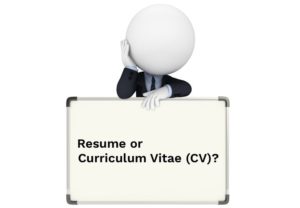When it comes to job applications, understanding the distinction between a CV and a Resume is crucial. While both documents serve as tools for presenting your professional background, they are used in different contexts and emphasize varying aspects of your experience.

By recognizing the nuances between these two documents, job seekers can effectively present their qualifications in a manner that aligns with employer expectations and increases the chances of landing their dream job.
What is a CV and When Should We Choose It?

A CV (Curriculum Vitae), is a comprehensive document that outlines an individual’s professional and educational history. It typically includes details such as work experience, education, skills, achievements, and qualifications.
We should use a CV when applying for academic positions, research roles, or jobs in certain industries that require a detailed overview of our background and accomplishments. A CV is particularly useful when we need to showcase a long history of work experience or academic achievements that are relevant to the position we are applying for.
What is a Resume and When Should We Choose It?
 A Resume is crucial in showcasing a concise summary of our skills and experiences to potential employers. A well-crafted resume serves as a snapshot of our professional background, highlighting our qualifications and achievements.
A Resume is crucial in showcasing a concise summary of our skills and experiences to potential employers. A well-crafted resume serves as a snapshot of our professional background, highlighting our qualifications and achievements.
Typically, resumes are used when applying for job opportunities in various industries and it is tailored to the specific job we are applying for. They provide recruiters with a concise overview of our career trajectory, making it easier for them to assess our suitability for the role.
What are the Key Differences Between CVs and Resumes?
When it comes to crafting a CV or Resume, understanding the differences is crucial to effectively choose the appropriate document format based on the career stage, industry, and targeted job positions.
1. Length
- CV: Typically longer, often spanning multiple pages.
- Resume: Generally shorter, ideally limited to one or two pages, focusing on concise and relevant information.
2. Content
- CV: Includes detailed information about academic background, such as degrees earned, research conducted, publications, presentations, conferences attended, grants received, and academic awards.
- Resume: Prioritizes relevant work experience, skills, and accomplishments directly related to the desired job. It may include a summary of education and academic achievements but is usually less detailed compared to a CV.
3. Format
- CV: Structured chronologically, starting with education and moving on to work experience, research, publications, presentations, honours, and awards.
- Resume: Can be structured chronologically or functionally, starting with a summary or objective statement followed by sections like work experience, education, skills, and achievements.
4. Purpose
- CV: Commonly used in academic, research, scientific, medical, grant applications, and international job applications.
- Resume: Used primarily for corporate, business, and non-academic job applications.
5. Flexibility
- CV: Less flexible in terms of customization, as it generally follows a standard format highlighting academic and research achievements.
- Resume: More flexible and often tailored for each job application to emphasize relevant skills and experiences that match the job description.
In conclusion, mastering the art of choosing between CVs and Resumes is crucial for achieving career success. Understanding the differences between these two documents and knowing when to use each one can make a significant impact on our job search.

It’s essential to adapt our approach based on the industry norms and preferences to make a lasting impression on hiring managers. An online resume builder like cvDragon can help us tailor our application materials to the specific requirements of the job we are applying for, and effectively showcase our skills and experiences in a way that resonates with the potential employers. Therefore, enhancing your chances of securing interviews and advancing in your career.